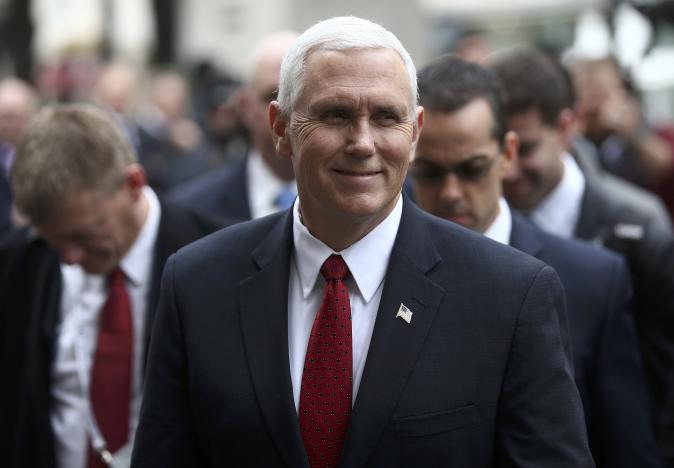Munich – U.S. Vice President Mike Pence said Saturday that Washington was committed to ensuring Iran would never obtain nuclear weapons.
In his first international foreign policy address for the Trump administration at the Munich Security Conference, Pence said that loosening sanctions on Iran as part of the agreement has helped Tehran finance terrorists.
Russia’s foreign minister Sergey Lavrov called for a “post-West world order” while addressing global leaders at MSC.
Lavrov accused NATO of being a Cold War institution and accused its “expansion” of sparking unprecedented tensions in Europe as both sides expand military deployments and drills.
He said he hoped “responsible leaders” will choose to create a “just world order – if you want you can call it a post-West world order”.
Lavrov suggested that relations with Washington should be pragmatic ruled by mutual respect. He also pointed out that there are several means of cooperation in many fields such as politics, economy and human causes.
Lavrov spoke hours after Pence who told European leaders that he spoke for Trump when he promised “unwavering” commitment to the NATO alliance.
“Today, on behalf of President Trump, I bring you this assurance: the United States of America strongly supports NATO and will be unwavering in our commitment to this transatlantic alliance,” Pence told MSC.
But he also repeated U.S. calls for more defense spending in return: “As you keep faith with us, under President Trump we will always keep faith with you.”
Pence admitted that Washington will continue to hold Russia accountable, even as they search for new common ground, “which as you know, President Trump believes can be found.”
“We must hold Russia accountable and demand that they honor the Minsk Agreements, beginning by de-escalating the violence in eastern Ukraine,” Pence said.
Pence reassured the attendees that the United States of America strongly supports NATO and will be unwavering in its commitment to its transatlantic alliance.
Pence sought to underscore a history of common endeavors and said Trump would maintain deep ties to Europe while also significantly increasing military spending in the United States.
“As you keep faith with us, under President Trump we will always keep faith with you. The fates of the United States and Europe are intertwined. Your struggles are our struggles. Your success is our success. And ultimately, we walk into the future together,” added the VP.
While he offered firm support for NATO, Pence reiterated demands for member nations to increase their military spending, meeting the collective’s requirement to spend 2% of GDP on defense.
“The President of the United States expects our allies to keep their word, fulfill this commitment, and for most that means the time has come to do more,” he said.
Speaking about Iran, Pence described Tehran as “the leading state sponsor of terrorism” and said it continued to destabilize the Middle East.
“Thanks to the end of nuclear-related sanctions under the nuclear deal, Iran now has additional resources to devote to these efforts,” he said.
“Let me be clear again: Under President Trump the United States will remain fully committed to ensuring that Iran never obtains a nuclear weapon capable of threatening our countries, our allies in the region, especially Israel,” stressed the VP.
Trump, along with Israel, is one of the strongest critics of the nuclear deal which was achieved during Obama’s presidency.
The French foreign minister, Jean-Marc Ayrault, tweeted his disappointment that Pence’s speech didn’t contain a word on the European Union. He said that this was because Trump has welcomed Brexit and seems hostile towards multilateral organizations such as the EU.
German Chancellor Angela Merkel insisted that multilateralism is more necessary than ever at a time of deepening crises, not least the rise of nationalism.
EU foreign policy chief Federica Mogherini reiterated EU’s strong support for full implementation of the Minsk agreements stressing on Russia’s responsibility in this issue.
Mogherini expressed commitment to EU’s engagement in accompanying the work of the Normandy format and of the OSCE.
When asked about Russia’s involvement in the U.S. presidential elections, Lavrov said no one had put forward any proof.
“Somehow when we are blamed, no one asked for facts,” Lavrov said demanding facts.
On the sidelines of Munich Security Conference, Saudi Minister of Foreign Affairs Adel al-Jubeir met with U.S. Secretary of Homeland Security John Kelly. The two discussed bilateral relations, security cooperation and common efforts exerted to combat terrorism, in addition to regional as well as world issues of common interest.
Jubeir also met with Mogherini where they discussed bilateral relations, Arab Gulf countries and the EU counterparts, in addition to issues of mutual interest.
Saudi FM, held talks with Special Envoy to Syria Staffan de Mistura concerning the latest developments related to the Syrian crisis, efforts exerted to resume political negotiations, based on the Geneva Declaration (Geneva 1) and the U.N. Resolution no. 2254.
In addition, the FM made various, separate, bilateral encounters with his Chinese, Qatari, Dutch and Norwegian counterparts, on the sidelines of Munich Security Conference.
During the meetings, he discussed with them bilateral relations and regional as well as world issues of common interest.
